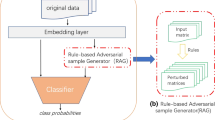Abstract
Text classification is a fundamental Natural Language Processing task that has a wide variety of applications, where deep learning approaches have produced state-of-the-art results. While these models have been heavily criticized for their black-box nature, their robustness to slight perturbations in input text has been a matter of concern. In this work, we carry out a data-focused study evaluating the impact of systematic practical perturbations on the performance of the deep learning based text classification models like CNN, LSTM, and BERT-based algorithms. The perturbations are induced by the addition and removal of unwanted tokens like punctuation and stop-words that are minimally associated with the final performance of the model. We show that these deep learning approaches including BERT are sensitive to such legitimate input perturbations on four standard benchmark datasets SST2, TREC-6, BBC News, and tweet_eval. We observe that BERT is more susceptible to the removal of tokens as compared to the addition of tokens. Moreover, LSTM is slightly more sensitive to input perturbations as compared to CNN based model. The work also serves as a practical guide to assessing the impact of discrepancies in train-test conditions on the final performance of models.
A. Miyajiwala, A. Ladkat, and S. Jagadale—Contributed equally.
Access this chapter
Tax calculation will be finalised at checkout
Purchases are for personal use only
Similar content being viewed by others
References
Albalawi, Y., Buckley, J., Nikolov, N.S.: Investigating the impact of pre-processing techniques and pre-trained word embeddings in detecting Arabic health information on social media. J. Big Data 8(1), 1–29 (2021)
Barbieri, F., Camacho-Collados, J., Neves, L., Espinosa-Anke, L.: Tweeteval: unified benchmark and comparative evaluation for tweet classification. arXiv preprint arXiv:2010.12421 (2020)
Devlin, J., Chang, M.-W., Lee, K., Toutanova, K.: Bert: pre-training of deep bidirectional transformers for language understanding. arXiv preprint arXiv:1810.04805 (2018)
Effrosynidis, D., Symeonidis, S., Arampatzis, A.: A comparison of pre-processing techniques for Twitter sentiment analysis. In: Kamps, J., Tsakonas, G., Manolopoulos, Y., Iliadis, L., Karydis, I. (eds.) TPDL 2017. LNCS, vol. 10450, pp. 394–406. Springer, Cham (2017). https://doi.org/10.1007/978-3-319-67008-9_31
Gao, J., Lanchantin, J., Soffa, M.L., Qi, Y.: Black-box generation of adversarial text sequences to evade deep learning classifiers. In: 2018 IEEE Security and Privacy Workshops (SPW), pp. 50–56. IEEE (2018)
Ghag, K.V., Shah, K.: Comparative analysis of effect of stopwords removal on sentiment classification. In: 2015 International Conference on Computer, Communication and Control (IC4), pp. 1–6. IEEE (2015)
Goel, K., Rajani, N.F., Vig, J., Taschdjian, Z., Bansal, M., Ré, C.: Robustness gym: unifying the NLP evaluation landscape. In: Proceedings of the 2021 Conference of the North American Chapter of the Association for Computational Linguistics: Human Language Technologies: Demonstrations, pp. 42–55 (2021)
HaCohen-Kerner, Y., Miller, D., Yigal, Y.: The influence of preprocessing on text classification using a bag-of-words representation. PloS One 15(5), e0232525 (2020)
Jacovi, A., Goldberg, Y.: Towards faithfully interpretable NLP systems: how should we define and evaluate faithfulness? In: Proceedings of the 58th Annual Meeting of the Association for Computational Linguistics, pp. 4198–4205 (2020)
Jin, D., Jin, Z., Zhou, J.T., Szolovits, P.: Is bert really robust? a strong baseline for natural language attack on text classification and entailment. In: Proceedings of the AAAI Conference on Artificial Intelligence, vol. 34, pp. 8018–8025 (2020)
Joshi, R., Goel, P., Joshi, R.: Deep learning for Hindi text classification: a comparison. In: Tiwary, U.S., Chaudhury, S. (eds.) IHCI 2019. LNCS, vol. 11886, pp. 94–101. Springer, Cham (2020). https://doi.org/10.1007/978-3-030-44689-5_9
Kitada, S., Iyatomi, H.: Attention meets perturbations: robust and interpretable attention with adversarial training. IEEE Access 9, 92974–92985 (2021)
Kowsari, K., Meimandi, K.J., Heidarysafa, M., Mendu, S., Barnes, L., Brown, D.: Text classification algorithms: a survey. Information 10(4), 150 (2019)
Andrew Kreek, R., Apostolova, E.: Training and prediction data discrepancies: challenges of text classification with noisy, historical data. In: Proceedings of the 2018 EMNLP Workshop W-NUT: The 4th Workshop on Noisy User-Generated Text, pp. 104–109 (2018)
Kulkarni, A., Mandhane, M., Likhitkar, M., Kshirsagar, G., Jagdale, J., Joshi, R.: Experimental evaluation of deep learning models for Marathi text classification. arXiv preprint arXiv:2101.04899 (2021)
Kulkarni, A., Mandhane, M., Likhitkar, M., Kshirsagar, G., Joshi, R.: L3cubemahasent: a Marathi tweet-based sentiment analysis dataset. In: Proceedings of the Eleventh Workshop on Computational Approaches to Subjectivity, Sentiment and Social Media Analysis, pp. 213–220 (2021)
La Malfa, E., Wu, M., Laurenti, L., Wang, B., Hartshorn, A., Kwiatkowska, M.: Assessing robustness of text classification through maximal safe radius computation. arXiv preprint arXiv:2010.02004 (2020)
Liu, J., et al.: Robustness testing of language understanding in task-oriented dialog. In: Proceedings of the 59th Annual Meeting of the Association for Computational Linguistics and the 11th International Joint Conference on Natural Language Processing (Volume 1: Long Papers), pp. 2467–2480 (2021)
Moradi, M., Samwald, M.: Evaluating the robustness of neural language models to input perturbations. In: Proceedings of the 2021 Conference on Empirical Methods in Natural Language Processing, pp. 1558–1570 (2021)
Nguyen, A., Yosinski, J., Clune, J.: Deep neural networks are easily fooled: high confidence predictions for unrecognizable images. In: Proceedings of the IEEE Conference on Computer Vision and Pattern Recognition, pp. 427–436 (2015)
Paleyes, A., Urma, R.-G., Lawrence, N.D.: Challenges in deploying machine learning: a survey of case studies. arXiv preprint arXiv:2011.09926 (2020)
Ribeiro, M.T., Wu, T., Guestrin, C., Singh, S.: Beyond accuracy: behavioral testing of nlp models with checklist. In: Proceedings of the 58th Annual Meeting of the Association for Computational Linguistics, pp. 4902–4912 (2020)
Singh, R., Joshi, T., Nair, V.N., Sudjianto, A.: Model robustness with text classification: semantic-preserving adversarial attacks. arXiv preprint arXiv:2008.05536 (2020)
Socher, R., et al.: Recursive deep models for semantic compositionality over a sentiment treebank. In: Proceedings of the 2013 Conference on Empirical Methods in Natural Language Processing, pp. 1631–1642 (2013)
Taware, R., et al.: Shuftext: a simple black box approach to evaluate the fragility of text classification models. arXiv preprint arXiv:2102.00238 (2021)
Voorhees, E.M., Harman, D.: Overview of the sixth text retrieval conference (trec-6). Inf. Process. Manag. 36(1), 3–35 (2000)
Wagh, V., Khandve, S., Joshi, I., Wani, A., Kale, G., Joshi R.: Comparative study of long document classification. arXiv preprint arXiv:2111.00702 (2021)
Wani, A., Joshi, I., Khandve, S., Wagh, V., Joshi, R.: Evaluating deep learning approaches for Covid19 fake news detection. In: Chakraborty, T., Shu, K., Bernard, H.R., Liu, H., Akhtar, M.S. (eds.) CONSTRAINT 2021. CCIS, vol. 1402, pp. 153–163. Springer, Cham (2021). https://doi.org/10.1007/978-3-030-73696-5_15
Wolf, T., et al.: Transformers: state-of-the-art natural language processing. In: Proceedings of the 2020 Conference on Empirical Methods in Natural Language Processing: System Demonstrations, pp. 38–45 (2020)
Zhang, Y., Wallace, B.: A sensitivity analysis of (and practitioners’ guide to) convolutional neural networks for sentence classification. arXiv preprint arXiv:1510.03820 (2015)
Zhou, C., Sun, C., Liu, Z., Lau, F.: A c-lstm neural network for text classification. arXiv preprint arXiv:1511.08630 (2015)
Acknowledgments
This work was done under the L3Cube Pune mentorship program. We would like to express our gratitude towards our mentors at L3Cube for their continuous support and encouragement.
Author information
Authors and Affiliations
Corresponding author
Editor information
Editors and Affiliations
Rights and permissions
Copyright information
© 2022 The Author(s), under exclusive license to Springer Nature Switzerland AG
About this paper
Cite this paper
Miyajiwala, A., Ladkat, A., Jagadale, S., Joshi, R. (2022). On Sensitivity of Deep Learning Based Text Classification Algorithms to Practical Input Perturbations. In: Arai, K. (eds) Intelligent Computing. SAI 2022. Lecture Notes in Networks and Systems, vol 507. Springer, Cham. https://doi.org/10.1007/978-3-031-10464-0_42
Download citation
DOI: https://doi.org/10.1007/978-3-031-10464-0_42
Published:
Publisher Name: Springer, Cham
Print ISBN: 978-3-031-10463-3
Online ISBN: 978-3-031-10464-0
eBook Packages: Intelligent Technologies and RoboticsIntelligent Technologies and Robotics (R0)




